For a list of books, and their contents, which I wrote alone or with others, co-edited, and of articles in learned journals, click here.
Mein erstes Buch, zusammen mit Winfried Garscha, kam 1987, am 60. Jahrestag des Justizpalastbrands, d.h. des Polizeimassakers, heraus: Wien 1927. Menetekel für die Republik
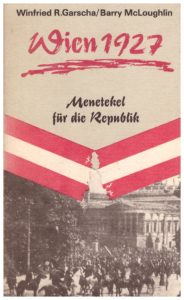 Die Studie verlegte in Ost-Berlin der Dietz Verlag, in Österreich der Globus Verlag. Unsere Arbeit stieß auf ein interessantes Publikum in Österreich und wurde mehrfach rezensiert und kommentiert, nicht zuletzt in einer Sonderbeilage der „Arbeiter-Zeitung“. Der Band, populärwissenschaftlich verfasst und verhältnismäßig billig, beruhte u.a. auf der peniblen Dissertation von Gerhard Botz, Zeitzeugeninterviews, Archivdokumenten und der Tagespresse der Zwischenkriegszeit. Neu an der Darstellung war die lange Vorgeschichte zum 15. Juli 1927, beispielsweise die ungesühnten Morde an Arbeitern, das „Zündeln“ von rechtsgerichteten Wehrverbänden im Burgenland, sowie die umfassende Beschreibung der Julitage 1927 in den Bundesländern. Heute würde ich die Politik der sozialdemokratischen Parteiführung mit mehr Nachsicht behandeln und jene der KPÖ kritischer darstellen. Das Buch ist antiquarisch erhältlich, besonders bei deutschen Händlern über www.abebooks.com
Die Studie verlegte in Ost-Berlin der Dietz Verlag, in Österreich der Globus Verlag. Unsere Arbeit stieß auf ein interessantes Publikum in Österreich und wurde mehrfach rezensiert und kommentiert, nicht zuletzt in einer Sonderbeilage der „Arbeiter-Zeitung“. Der Band, populärwissenschaftlich verfasst und verhältnismäßig billig, beruhte u.a. auf der peniblen Dissertation von Gerhard Botz, Zeitzeugeninterviews, Archivdokumenten und der Tagespresse der Zwischenkriegszeit. Neu an der Darstellung war die lange Vorgeschichte zum 15. Juli 1927, beispielsweise die ungesühnten Morde an Arbeitern, das „Zündeln“ von rechtsgerichteten Wehrverbänden im Burgenland, sowie die umfassende Beschreibung der Julitage 1927 in den Bundesländern. Heute würde ich die Politik der sozialdemokratischen Parteiführung mit mehr Nachsicht behandeln und jene der KPÖ kritischer darstellen. Das Buch ist antiquarisch erhältlich, besonders bei deutschen Händlern über www.abebooks.com
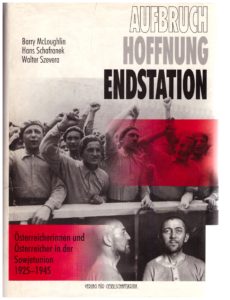 Die zweite Publikation war ebenfalls ein gemeinsames Produkt: Barry McLoughlin/Hans Schafranek und Walter Szevera, Aufbruch-Hoffnung-Endstation. Österreicherinnen und Österreicher in der Sowjetunion 1925-1945. (Verlag für Gesellschaftskritik, Wien 1997). Es war das erste Ergebnis meiner zahlreichen Aufenthalte in Moskauer Archiven zwischen 1991 und 2002. Da der Band längst vergriffen und der Verlag eingegangen ist, stelle ich meinen Teil (über die Schutzbündler) hier zum freien Download. Auf Einladung von Dr. Heinz Fischer, (damals) Präsident des Nationalrates, wurde unser Buch am 3. März 1997 im Parlament vorgestellt.
Die zweite Publikation war ebenfalls ein gemeinsames Produkt: Barry McLoughlin/Hans Schafranek und Walter Szevera, Aufbruch-Hoffnung-Endstation. Österreicherinnen und Österreicher in der Sowjetunion 1925-1945. (Verlag für Gesellschaftskritik, Wien 1997). Es war das erste Ergebnis meiner zahlreichen Aufenthalte in Moskauer Archiven zwischen 1991 und 2002. Da der Band längst vergriffen und der Verlag eingegangen ist, stelle ich meinen Teil (über die Schutzbündler) hier zum freien Download. Auf Einladung von Dr. Heinz Fischer, (damals) Präsident des Nationalrates, wurde unser Buch am 3. März 1997 im Parlament vorgestellt.
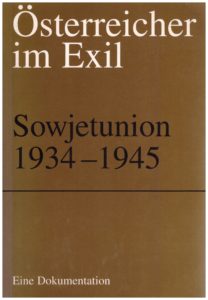 Daran anschließend druckte das Dokumentationsarchiv des österreichischen Widerstandes (DÖW) 1999 viele der von uns in Moskau und Wien gefundenen Archivalien in einem kommentierten Band ab: Österreicher im Exil. Sowjetunion 1934-1945, Verlag Deuticke, Wien 1999, Einleitung, Auswahl und Bearbeitung: Barry McLoughlin, Hans Schafranek
Daran anschließend druckte das Dokumentationsarchiv des österreichischen Widerstandes (DÖW) 1999 viele der von uns in Moskau und Wien gefundenen Archivalien in einem kommentierten Band ab: Österreicher im Exil. Sowjetunion 1934-1945, Verlag Deuticke, Wien 1999, Einleitung, Auswahl und Bearbeitung: Barry McLoughlin, Hans Schafranek
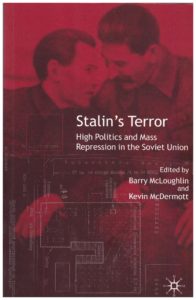 While studying the fate of political emigrants in 1930s Russia, which included access to NKVD files of those repressed, I decided to bring the state of research in the terror years of 1936-1938 up to date by inviting colleagues (USA, Austria, Germany, Russia) to contribute to a collection of essays on the Great Terror I co-edited with Kevin McDermott (Sheffield Hallam University): Stalin’s Terror. High Politics and Mass Repression in the Soviet Union. The volume was published in hardback in 2003, and in paperback a year later, by Palgrave Macmillan. It is still in print
While studying the fate of political emigrants in 1930s Russia, which included access to NKVD files of those repressed, I decided to bring the state of research in the terror years of 1936-1938 up to date by inviting colleagues (USA, Austria, Germany, Russia) to contribute to a collection of essays on the Great Terror I co-edited with Kevin McDermott (Sheffield Hallam University): Stalin’s Terror. High Politics and Mass Repression in the Soviet Union. The volume was published in hardback in 2003, and in paperback a year later, by Palgrave Macmillan. It is still in print
Over the years I also acquired knowledge about Irish citizens who lived in Stalin’s Russia. Three of them were arrested. I knew that if I could locate their families in Ireland access to their party and secret police files would be possible. Through friends in Dublin I located the family of Patrick Breslin, a former student of the Lenin School who died in Kazan prison hospital in 1942. The daughter from his second marriage, Mairead Breslin Kelly, gave me the necessary documentation and I was also able to find, in Russia, the children of Breslin’s first marriage, Mairead’s step-brother Genrikh and step-sister Irina. Mairead’s niece, the film-maker Yvonne McDonald (Producer and Director), and I (Writer/Associate Producer) wrote a script for a documentary on Breslin and the reunification of his children, which was accepted by RTE. Donald Taylor-Black was Executive Producer and the filming took place in Moscow, Pushtshino and Kazan in 2000. “Amongst Wolves”was broadcast on RTE One on 26 February 2001 and shown again the following year.
See: https://www.irishtimes.com/culture/the-irish-socialist-whose-dream-ended-in-the-gulag-1.284019
Through Mairead I got to know David Simms, Professor of Mathematics at TCD, whose uncle Brian Goold Verschoyle had disappeared in Russia during the 1930s. Brian was a radio expert for the Soviet secret police in Valencia during the Spanish Civil War. He was kidnapped there by his superiors and brought to the Soviet Union where he died in prison in 1942. With David’s letter-of-attorney I gained access to Brian communist party file and his NKVD dossier. The third victim, Sean McAteer, remained a mystery but I knew he has been arrested and shot in Odessa in 1937. Ukrainian historian colleagues assisted me in gaining access to the Ukrainian secret police (USB) archive in Kiev, and to McAteer’s prosecution folder. It later turned out, after my appearance on the Pat Kenny radio show, that McAteer was not from the border region as he told his interrogators, but was a real “Scouser”, a Liverpudlian, who fought in the Irish Civil War and later fled to Russia after he had killed a man in a botched post-office robbery in Liverpool in 1923. His nephew, Eamonn McAteer from Artane, Dublin, helped to correct the historical record. I am also grateful to him for more family details. Sean McAteer’s accomplice in the robbery was Jim Phelan, later a famous writer. Phlean had to “carry the can”: Phelan was sentenced to death, but the sentence was commuted to life imprisonment. He was released in 1938.
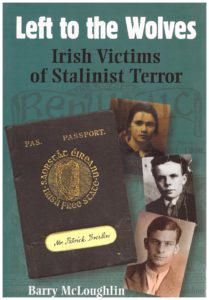 Based on the material on the three victims (Breslin, Goold Verschoyle, McAteer) I wrote Left to the Wolves. Irish Victims of Stalinist Terror (Irish Academic Press). It was launched at the Royal Irish Academy on 1 March 2007. The book is still on sale.
Based on the material on the three victims (Breslin, Goold Verschoyle, McAteer) I wrote Left to the Wolves. Irish Victims of Stalinist Terror (Irish Academic Press). It was launched at the Royal Irish Academy on 1 March 2007. The book is still on sale.
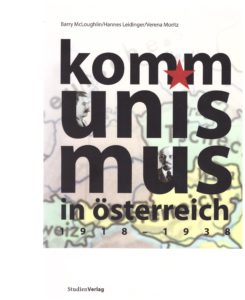 Mein nächstes Projekt untersuchte die Aktivitäten der Kommunistischen Internationale im Österreich der Zwischenkriegszeit: die Rolle der KPÖ, Wien als Basis und Drehscheibe für verbotene KPen (Ungarn, Bulgarien, Rumänien usw.) und sowjetische Auslandsgeheimdienste. Mit meinen Kollegen Hannes Leidinger und Verena Moritz stellte ich 2007 unser Kommunismus in Österreich 1918-1938 (Studienverlage Innsbruck, Kartoniert 2007, Taschenbuch 2016) gemeinsam vor.
Mein nächstes Projekt untersuchte die Aktivitäten der Kommunistischen Internationale im Österreich der Zwischenkriegszeit: die Rolle der KPÖ, Wien als Basis und Drehscheibe für verbotene KPen (Ungarn, Bulgarien, Rumänien usw.) und sowjetische Auslandsgeheimdienste. Mit meinen Kollegen Hannes Leidinger und Verena Moritz stellte ich 2007 unser Kommunismus in Österreich 1918-1938 (Studienverlage Innsbruck, Kartoniert 2007, Taschenbuch 2016) gemeinsam vor.
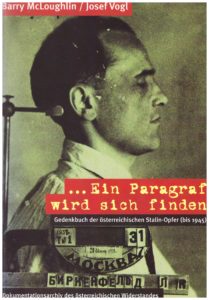 Jahrelang trugen Josef Vogl (DÖW) und ich Materialien für die Biografien aller bisher bekannten österreichischen Opfern Stalins zusammen. Die Biographien (769) mit Zusatzkapiteln präsentierten wir am 19. Juni 2013 im Institut für Publizistik der Universität Wien. Ein Paragraph wird sich finden. Gedenkbuch der österreichischen Stalin-Opfern wurde vom DÖW herausgegeben und kann von dort bezogen werden (Angebote von Händlern im Internet sind unverschämt teuer). Für die einzelnen Biografien sowie einen von mir verfassten geschichtlichen Überblick über den Großen Terror in der UdSSR siehe: http://www.doew.at/erinnern/biographien/oesterreichische-stalin-opfer-bis-1945
Jahrelang trugen Josef Vogl (DÖW) und ich Materialien für die Biografien aller bisher bekannten österreichischen Opfern Stalins zusammen. Die Biographien (769) mit Zusatzkapiteln präsentierten wir am 19. Juni 2013 im Institut für Publizistik der Universität Wien. Ein Paragraph wird sich finden. Gedenkbuch der österreichischen Stalin-Opfern wurde vom DÖW herausgegeben und kann von dort bezogen werden (Angebote von Händlern im Internet sind unverschämt teuer). Für die einzelnen Biografien sowie einen von mir verfassten geschichtlichen Überblick über den Großen Terror in der UdSSR siehe: http://www.doew.at/erinnern/biographien/oesterreichische-stalin-opfer-bis-1945
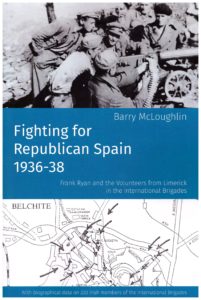 Fighting for Republican Spain 1936-1938. Frank Ryan and the Volunteers from Limerick, was launched in Limerick city (Hunt Museum) on 4 September 2014. With the assistance of my brother Mike this self-published study was placed in bookshops in Limerick and Galway and sold at presentations in Labour History Museum Dublin (8 September 2014) Knocklong, Co. Limerick (31 October 2014), Belfast (6 February 2015), Derry (7 February 2015), Galway (10 February 2015), Cork (12 February 2015), Vienna University (October 2015) and Knockainey, Co. Limerick (22 July 2017). The book is a kind of Mk I for a definitive study on the Irish in the International Brigades planned by Emmet O’Connor and myself. The book is available here.
Fighting for Republican Spain 1936-1938. Frank Ryan and the Volunteers from Limerick, was launched in Limerick city (Hunt Museum) on 4 September 2014. With the assistance of my brother Mike this self-published study was placed in bookshops in Limerick and Galway and sold at presentations in Labour History Museum Dublin (8 September 2014) Knocklong, Co. Limerick (31 October 2014), Belfast (6 February 2015), Derry (7 February 2015), Galway (10 February 2015), Cork (12 February 2015), Vienna University (October 2015) and Knockainey, Co. Limerick (22 July 2017). The book is a kind of Mk I for a definitive study on the Irish in the International Brigades planned by Emmet O’Connor and myself. The book is available here.
In Spanish Trenches, The Mind and Deeds of the Irish who fought for the Republic in the Spanish Civil War. 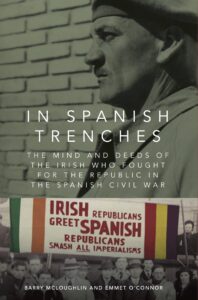 The Spanish Civil War has an enduring fascination, not least for the way it drew some 35,000 non-Spaniards to risk their lives to halt the march of fascism. It has also acquired renewed relevance from the resurgence of neo-fascism in Europe. At the same time, the representation of International Brigaders as champions of liberty and stainless heroes has been subject to increasing scrutiny by scholars of international communism, notably since the opening up of former Soviet archives. This definitive study of the Connolly Column – the Irish who fought for Republican Spain – reassesses the Irish experience in the light of sources at home and in Russia, Spain, Germany, Austria, and Britain, driven by a conviction that Ireland was not so isolated in the 1930s and needs to be understood in a more comparative way. In interrogating the publicity generated by the supporters of the Spanish Republic in Ireland, north and south, it shows too how communist groups in Spain waged the war with one eye on its propaganda value back home. The account is novel in providing a detailed narrative of what the Irish actually did in Spain. In graphic descriptions of combat and life behind the lines, it illustrates how International Brigades units operated, how politics affected their efficiency, and what their command systems meant for the life, and death, of ordinary brigadistas.
The Spanish Civil War has an enduring fascination, not least for the way it drew some 35,000 non-Spaniards to risk their lives to halt the march of fascism. It has also acquired renewed relevance from the resurgence of neo-fascism in Europe. At the same time, the representation of International Brigaders as champions of liberty and stainless heroes has been subject to increasing scrutiny by scholars of international communism, notably since the opening up of former Soviet archives. This definitive study of the Connolly Column – the Irish who fought for Republican Spain – reassesses the Irish experience in the light of sources at home and in Russia, Spain, Germany, Austria, and Britain, driven by a conviction that Ireland was not so isolated in the 1930s and needs to be understood in a more comparative way. In interrogating the publicity generated by the supporters of the Spanish Republic in Ireland, north and south, it shows too how communist groups in Spain waged the war with one eye on its propaganda value back home. The account is novel in providing a detailed narrative of what the Irish actually did in Spain. In graphic descriptions of combat and life behind the lines, it illustrates how International Brigades units operated, how politics affected their efficiency, and what their command systems meant for the life, and death, of ordinary brigadistas.
Reviews: The Irish Times, Irish Examiner, Dublin Review of Books, The Volunteer, Jacobin, History Ireland, Waterford News & Star
